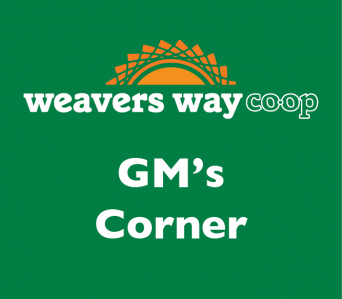
GM's Corner: Bring Philly Factories Back to Life — Cooperatively

There’s a map of our area on the wall in my office, pierced with pushpins showing the locations of our little Co-op Empire: the two stores, the two farms, the warehouse on Hunting Park Avenue.
Mariposa Food Co-op in West Philadelphia and Creekside Co-op in Elkins Park have pins too, as does the soon-to-be Kensington Food Co-op at Frankford and Lehigh and our own possible new store in Ambler.
The map is instructive in that you can trace on it the development of Philadelphia over the centuries. We are known most famously for our colonial era — Birthplace of the Nation and all that. That’s what the tourists come to see.
But looking at the map, one comes to see how small colonial Philadelphia was compared to the city we know today. Today’s Philadelphia is largely, in fact almost entirely, the product of the Industrial Revolution, built in the second half of the 19th century and first half of the 20th.
The bones of this great industrial city are all still here: the rail lines, the consolidation yards, the wharfs, and the hundreds of thousands of rowhouses, built to house workers’ families close to the factories in which they toiled.
A lot of the factory buildings are still here too, some converted into lofts for tattooed hipsters, some repurposed as warehouses or churches or concert halls, a very small number still being used to make things. Most are just abandoned.
Philadelphia is slowly reinventing itself, developing a service economy reliant on tourism, education, and healthcare (“eds and meds”). That’s all good.
But looking at my map, I can’t help but ask: How can our city get back to doing what it was built to do? How can Philadelphia start making things again?
A certain presidential candidate says the fix is easy. Negotiate better trade deals, tip the economics in favor of building things in the United States and presto, those abandoned workshops in North Philadelphia will start humming again.
One need not be an economist to see through this political bluster, intended to fool the ill-informed. There is no easy fix.
But that doesn’t mean Philadelphia cannot get back some of its industrial past. The infrastructure is all there, as is easy access to consumers (highways, railways, and the port all make getting stuff in and out of here a breeze). There’s also a huge underemployed labor force.
To the annoyance of many, my solution to almost everything is cooperation — in this case cooperation between city government, which wants the tax revenues generated by working factories, and city residents, who want the jobs generated by working factories.
With a concerted effort, over time Philadelphia could become the American equivalent of Mondragon, the region of Spain that’s home to the Mondragon Cooperative Corp., responsible for nearly 4 percent of the region’s GDP.
And now we have an opportunity to get things going.
Later this month, City Council is holding a hearing on cooperative development in Philadelphia. Councilman Derek Green, a member of Weavers Way, called the hearing, with the support of, among others, our district councilwoman, Cindy Bass. I’ve been asked to testify, as have other leaders of the cooperative economy in and around Philadelphia.
My goal will mostly be to get the word out about the cooperative model and the potential benefits to the city of growing the cooperative economy. They’ll hear me talk about keeping profits local, reducing our reliance on fickle out-of-town corporations, the resiliency of cooperatives in the ebb and flow of the business cycle, and the elimination of worry that employers will relocate to greener pastures where the labor’s cheaper and the taxes lower.
One potential outcome of the hearings could be the development of a fund to assist co-ops with their development, as some other cities, including New York, have done.
It could serve as a good first step in what would be a long but potentially very rewarding endeavor.
If you’re interested, I urge you to attend the hearing on Monday, Oct. 24, from 1 to 3 p.m. in City Hall Room 400.
See you around the Co-op.
